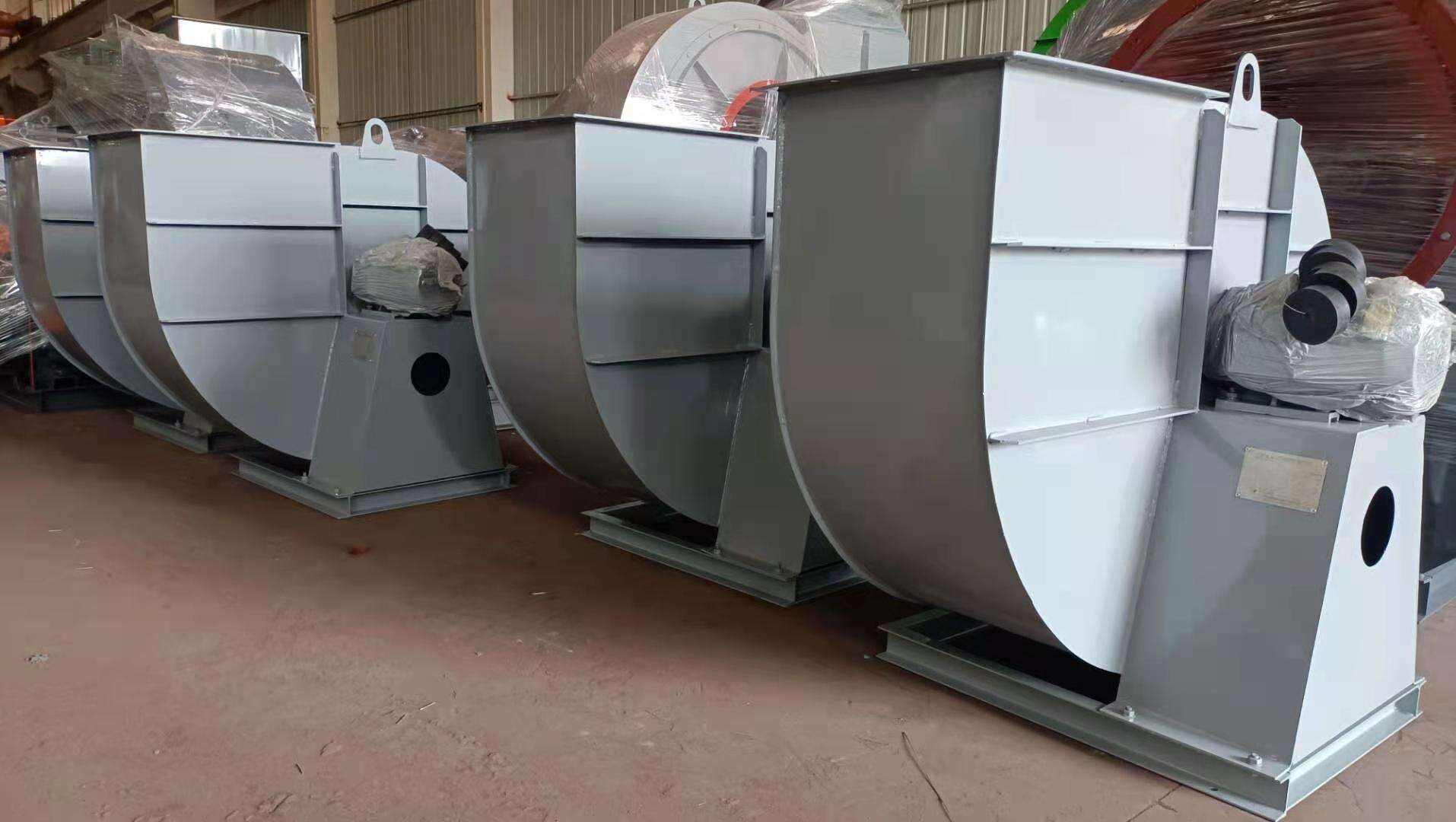How Centrifugal Fans Enhance Dust System Performance
Core Mechanism: From Impeller to Airflow
Centrifugal fans work by turning the spinning motion of the impeller into actual moving air, which creates strong airflow needed for good dust system operation. How the impeller is built matters a lot too. Things like how many blades it has and what angle they're set at really affect how efficiently air moves through the system and makes the whole fan do its job better. When an impeller is designed well, it helps guide the air smoothly without creating too much turbulence or making loud noises, something that's super important for dust collection systems to work properly. Getting this right means better efficiency overall and improved performance in places where keeping things clean and maintaining air quality is essential, like factories and manufacturing plants across various industries.
High-Pressure Generation for Particle Extraction
Centrifugal fans excel at creating those pressure differences needed to push air through all the obstacles in dust collection systems like filters and ducts. When there's enough pressure behind them, these systems can actually pull out most of the fine particles floating around, which makes a real difference in how clean the air stays in factories and workshops. Studies have shown time and again that when pressure is generated properly, it cuts down on how often filters get blocked and reduces the need for constant cleaning and repairs. The fact that centrifugal fans keep up steady pressure levels means dust collectors run smoothly day after day without losing power, which explains why so many industries rely on them to keep workspaces safe from harmful airborne contaminants.
Radial Airflow vs. Axial Limitations
Radial airflow in centrifugal fans gives real benefits when moving bigger dust particles compared to axial models that often struggle with heavier loads. When dealing with different kinds of dust and changing density levels throughout the day, radial fan designs tend to keep performing reliably no matter what comes their way, making them better for overall system performance. Knowing when each type works best matters a lot for picking equipment that actually controls dust effectively. Getting this right helps maintenance teams make smarter choices so dust collection systems run efficiently even as factory conditions change from one shift to another.
Critical Components for Industrial Dust Control
Impeller Design for Particulate Handling
Getting the impeller right matters a lot when dealing with dust particles in control systems. Good designs need to incorporate materials that stand up to wear and tear while shaping blades in ways that actually work better with particulates. Blade dimensions matter too – thicker and taller blades tend to last longer and perform better in harsh conditions where dust builds up over time. Manufacturers who invest in newer impeller technology often see anywhere from 20 to 30 percent better performance out of their industrial fans. These improvements mean systems handle dust more effectively day after day, which ultimately means fewer breakdowns and less maintenance down the road for plant operators concerned about system uptime.
Volute Casing Efficiency
Volute casings play a key role in converting the fast moving air from the impeller into something closer to a steady stream, making dust collection work better. When engineers design these casings to cut down on turbulent airflow, they actually get better pressure recovery and boost the whole dust control system's performance. Industry reports indicate that smart casing designs can save around 15% on energy bills, which makes a real difference in running costs over time. What makes volute casings special is how their shape helps guide the air smoothly through the system. This reduces both friction and those annoying turbulence losses that waste so much energy in poorly designed systems.
Sealed Bearings in Harsh Environments
The performance and lifespan of centrifugal fans really depends on good sealed bearings, especially when they're running in places with lots of dust or chemical exposure. When we install quality sealed bearings, it means less frequent maintenance work and longer time before needing replacement parts. Some field tests have shown that getting the bearing selection right can cut down on failures by around 25%. For manufacturers working in factories or processing plants, this matters a lot because every hour lost to breakdowns costs money. The reliability factor becomes even more significant in continuous operation facilities where production lines simply cannot afford unexpected stoppages.
Optimizing Centrifugal Fans for Dust Collection
Calculating Static Pressure Requirements
Getting static pressure calculations right matters a lot when picking out the right centrifugal fan for a dust collection setup. Engineers need to factor in everything that creates resistance within the system – think filters clogging up over time, those long stretches of ductwork, and all those awkward bends that slow things down. These elements really affect how well air moves through the whole thing. When folks actually grasp what's going on here, they pick fans that work properly for their particular needs. There are formulas and specialized software out there specifically made for characterizing fans, help systems handle different situations better. The math behind this isn't just about making things run smoothly; getting it right means longer equipment life too since nobody wants to deal with problems caused by either too little or too much airflow in the system.
Balancing CFM and System Resistance
Getting the right balance between Cubic Feet per Minute (CFM) ratings and system resistance matters a lot when it comes to how well fans perform and their overall efficiency. When things get out of whack, we end up with either way too much energy being used or dust collection systems that just don't work properly, which affects everything from day-to-day performance down to what's spent on running costs. Engineers nowadays rely on various analytical software packages to see exactly how systems are performing visually, then tweak settings so CFM matches up correctly with resistance levels across different parts of the system. Taking this kind of hands-on approach before problems arise actually makes operations run better while keeping money in the bank through reduced power bills over time.
Explosion-Proof Configurations
For companies dealing with combustible dust in manufacturing settings, making sure centrifugal fans are explosion proof isn't optional it's essential for worker protection. These specially designed systems stop sparks from igniting dust particles, which keeps facilities compliant with OSHA requirements while protecting personnel on site. When manufacturers invest in heavy duty materials and follow strict safety protocols like NFPA standards, they dramatically cut down on potential disasters in facilities handling things like wood chips, grain powders, or metal filings. Beyond ticking boxes on inspection lists, creating safer workplaces means fewer accidents, lower insurance costs, and ultimately better business outcomes when operations run smoothly without unexpected shutdowns.
Industrial Applications in Material Handling
Woodshop Dust Extraction Systems
Wood shops generate plenty of fine dust particles that can really hurt workers' lungs over time unless they get sucked out properly. Centrifugal fans work great in these spaces because they handle the constant flow of airborne debris better than other fan types. When woodworkers install custom made dust collection systems, the air quality improves dramatically and keeps them on the right side of OSHA safety rules. Shops that actually put these systems into practice report cutting down on floating wood particles by around 90 percent in their workshops. For anyone running a woodworking business, picking the right ventilation setup isn't just about following regulations it's essential for keeping employees healthy and making sure production doesn't slow down due to poor air conditions.
Foundry Fume Removal Solutions
Foundries operate under intense heat conditions where proper fume extraction becomes absolutely essential. Centrifugal fans work well in these harsh environments because they maintain consistent airflow even when temperatures spike. Many modern installations now pair these fans with smart temperature sensors and real time monitoring systems. This combination improves workplace safety for workers exposed to metal dust and toxic gases. According to several industry reports from the past five years, effective fume management reduces respiratory issues among staff by around 40%. Plus it cuts down on maintenance costs since equipment lasts longer without constant exposure to corrosive airborne particles. Manufacturers who invest in quality ventilation systems typically see returns within two years through reduced downtime and lower healthcare expenses related to occupational illnesses.
Grain Silo Ventilation Strategies
Keeping moisture levels under control matters a lot when storing grain, which is why centrifugal fans play such a big part in creating the right environment inside storage facilities. These fans move air through the grain mass, helping to keep it fresh and reducing the chances of mold growth or insect problems that can ruin entire batches. Studies show good airflow can actually extend how long grain stays usable and keeps its selling price intact. Farmers know this well because they've seen what happens when air doesn't circulate properly in silos. That's why proper ventilation isn't just about moving air around it's about safeguarding investments worth thousands of dollars in many cases.
Each of these applications exemplifies the versatility and necessity of centrifugal fans in diverse industrial processes to optimize air quality, safety, and product longevity.
Maintenance Strategies for Peak Efficiency
Blade Cleaning Protocols
Keeping those fan blades clean regularly stops dust from building up, something that really hurts how well they work and their overall efficiency. When dust starts accumulating on the blades, it actually makes the centrifugal fans less effective at doing their job. This leads to problems like overheating and higher electricity bills too. A good idea is setting up some kind of cleaning routine, maybe twice a year works for most setups. This kind of maintenance not only catches small problems before they become big ones but also keeps air flowing properly through the system. Stick with this cleaning plan and the equipment will last longer than expected, cutting down on those surprise breakdowns during critical operations.
Vibration Monitoring Techniques
Keeping an eye on fan vibrations offers a good way to spot problems before they cause bigger issues. With better sensors and software now available, it's much easier to track how fans are performing in real time. The information collected helps technicians catch small problems while there's still time to fix them, which means fewer unexpected breakdowns when production is running. Research shows that companies using vibration monitoring actually save money in the long run because they know exactly what parts need attention. These systems give maintenance teams clear pictures of how healthy each fan really is, making preventive work much more effective than waiting for something to break down first.
Filter Compatibility Checks
Getting the right filters to work with centrifugal fans matters a lot if we want good airflow and efficient systems running smoothly. Mismatched filters create all sorts of problems because they block air flow too much, which makes everything perform worse and needs constant fixing or replacing parts. The smart move here is regular inspections every few months at least. This helps catch small problems before they become big headaches that shut down operations and eat into profits. Companies that make sure their filters fit properly end up saving money long term while keeping their machinery in better condition. Plus, it's just plain smarter operationally when things actually work as intended from day one.

